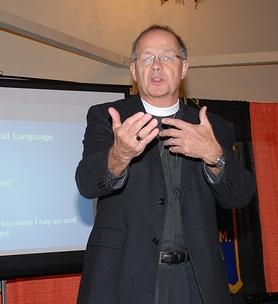The Reverend Stephen Smith: “Faith, Values, and Work”
Posted by Michael Blackwell
on Nov 03, 2011
 “Let me tell you about the day I knew I was irrelevant,” began Rotary AM member Stephen Smith, a.k.a the Rockin’ Reverend of the band Rev’d Up. In a survey done in the 1990’s, about 40% of the people polled claimed they went to a religious service at least once a week. A religious group, the Church of Christ in Lorraine, thought the number seemed high. They did a follow-up study to find out how often people really go to church. They found that people were—to put it politely—exaggerating their attendance. In fact, about 20% of people were regularly attending.”
“Let me tell you about the day I knew I was irrelevant,” began Rotary AM member Stephen Smith, a.k.a the Rockin’ Reverend of the band Rev’d Up. In a survey done in the 1990’s, about 40% of the people polled claimed they went to a religious service at least once a week. A religious group, the Church of Christ in Lorraine, thought the number seemed high. They did a follow-up study to find out how often people really go to church. They found that people were—to put it politely—exaggerating their attendance. In fact, about 20% of people were regularly attending.”“The numbers are even lower today. Recently, as I was working with a wedding party, I found that only two of the 16 people knew the Lord’s Prayer. All along, I thought I was working with people who knew religion and I was there to help those who wished to explore more deeply. It isn’t so. People don’t just absorb religion through osmosis. They are lacking in a basic understanding of the tenets of the Christian faith and, perhaps even more alarmingly, in the knowledge that helps to create a shared culture.”
“It raises the question of how ethics and values are learned in our culture. There are two basic ways. The first demands,
‘Do this because I say so, and I’m right.’ It leads to little common ground, little understanding, and much fighting. The second posits ‘Follow these rules because they are good, and here is why.’
Such is the Constitution. It tells our story. It shapes our values. It defines who we are as a culture. It reduces conflict because people know the document and can see that they have shared values.”
“What is happening now is that the common story is changing. I can no longer assume that people know the Christian story. When we lose the common story, we go into conflict, even if, as is the case, we (like Republicans and Democrats) might each have a piece of the common story. We are bifurcated.”
“What then IS our common story as Americans? If anything provides it today, I think it is work. And this raises a question for me: what is the connection between faith, or our ethical values, and work? If they are in conflict, we will need to develop a new common story. We all work more and more, and we all have our own deepest values—do we have times when those are in conflict? If so, that’s when we are writing a new story for ourselves. I’m not sure what that story will be. But I’m researching it. I’d like to know what our changing story is, if we are no longer sharing some of the older sources of a common story. And I do believe we need a common story to emerge. If we are just content to stare at each other we will may find that a story, a culture, develop that we don’t like or want.”
Stephen is studying this fascinating if vexing question as part of his doctoral research. If you’d like to help Steve with his research, and to learn better what our sources of values might be, ask him for his short survey. As he does his research, perhaps we will all have a chance to hear from him again to see what he is learning about what we share and, just maybe, help to create a common story that Rotarians would like to see.